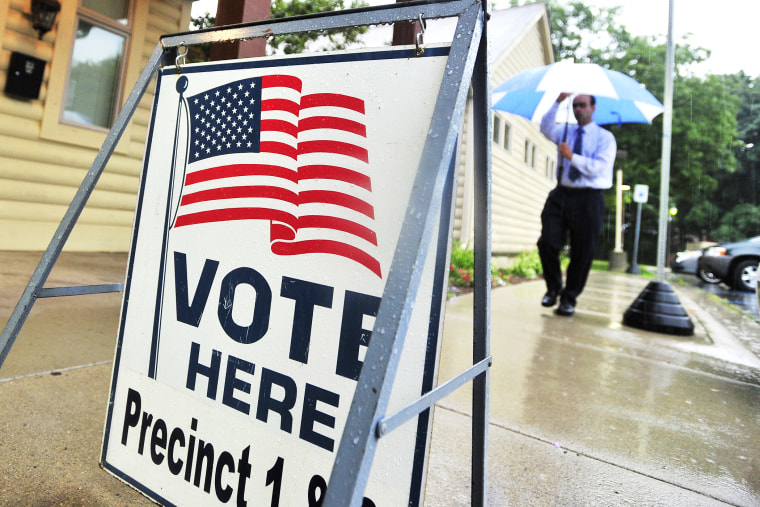Early last year, Republican officials in a variety of states were pretty frustrated by the scope of President Obama's re-election victory. They decided the electoral college might need a little touch-up, tilting the playing field in the GOP's direction -- if Republicans were losing, it was time to change the rules of the game.
And so,
a scheme was hatched: instead of allocating electoral votes on a winner-take-all basis, the way nearly all states have done throughout American history, several key states would rig the election by awarding votes based on gerrymandered congressional district lines. GOP operatives in Florida, Ohio, Michigan, Pennsylvania Virginia, and Wisconsin immediately took up the cause.
The push didn't last long, and within a few months, as revulsion to the scheme grew, each of the states had effectively given up on the idea.
And though Michigan, run by a Republican governor and Republican state legislature, backed off on the scheme, support for the idea
lingered in the Wolverine State for quite a while. In fact,
it's back.
Michigan would divide its electoral college votes in presidential elections rather than award them all to a single candidate under legislation being introduced Thursday in the state House. Sponsoring Rep. Pete Lund, R-Shelby Township, says the bill would make Michigan more important in presidential elections, but Democrats argue it would only benefit Republicans, who haven't won a presidential election in Michigan since 1988.
Michigan isn't
entirely alone. Zach Roth
reported last week that the scheme may rear its head in 2015 now that Republican control of state governments has grown, and
National Review published a
piece calling the election-rigging plan "pretty tempting," largely because it would make it "nearly impossible" for the country to elect a Democratic president.
But in Michigan, proponents aren't just thinking about possible action in the new year; all of this is playing out right now. In fact, there was a legislative committee hearing on a proposal literally yesterday.
A bill to split Michigan's 16 electoral votes based on the popular vote for president, ending the winner-take-all system the state has used for more than a century, was harshly criticized by most witnesses who testified at a legislative hearing at the Capitol Monday. Several witnesses described House Bill 5974 as a blatant attempt to rig the next presidential election in Michigan to the advantage of Republicans, who haven't won Michigan's electoral votes since 1988.
GOP state lawmaker Pete Lund said his scheme might make Michigan a more competitive battleground. Political scientists, historians, and election experts testified yesterday that Lund has it backwards -- the moment Michigan abandons its existing model is the moment presidential hopefuls give up on campaigning in the state altogether, knowing that the Michigan's electoral haul will be split no matter who wins more votes.
Former Michigan Secretary of State Jocelyn Benson, dean of the Wayne State University Law School, spoke on behalf of the Michigan Center for Election Law, explained, "This would diminish our prowess and make us more of a flyover state."
Lund said he would not change his plan in response to experts' testimony.
Note, the proposal has changed since its rejection last year. Instead of relying on congressional districts, the new scheme is even more complicated. From the Free Press' report: "Under Lund's proposal, the candidate winning the popular vote in Michigan would get at least nine electoral college votes -- half the votes, plus one extra -- in addition to one electoral vote for every 1.5 percentage points above 50% of the popular vote that candidate wins. Any electoral college votes left over would go to the second-place finisher."
If this needlessly complex model was applied to the 2012 results, Michigan would have given a fourth of its electoral votes to Mitt Romney, even though he lost Michigan to President Obama by nearly 10 percentage points.
Odds are, this latest gambit will fail -- Gov. Rick Snyder (R) has been "
reluctant" to pursue it -- but this year's legislative push is still underway and Republican control of Michigan state government will not change in 2015, giving proponents a new opportunity to try again.
Of course, the fact that some GOP policymakers still see this nonsense as a credible solution to election losses is itself amazing, regardless of the plan's legislative prospects.
